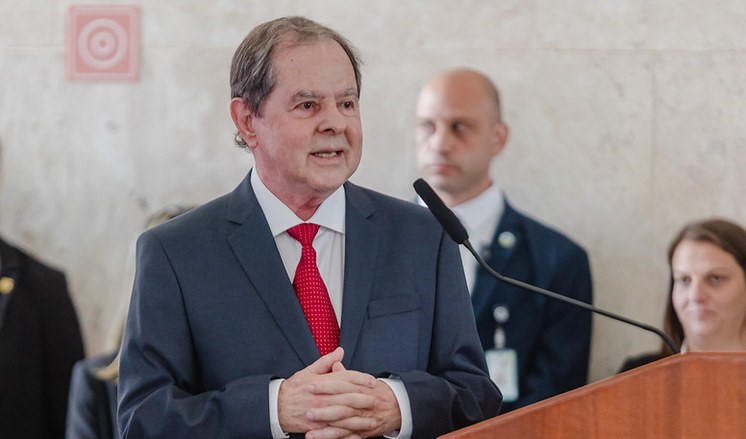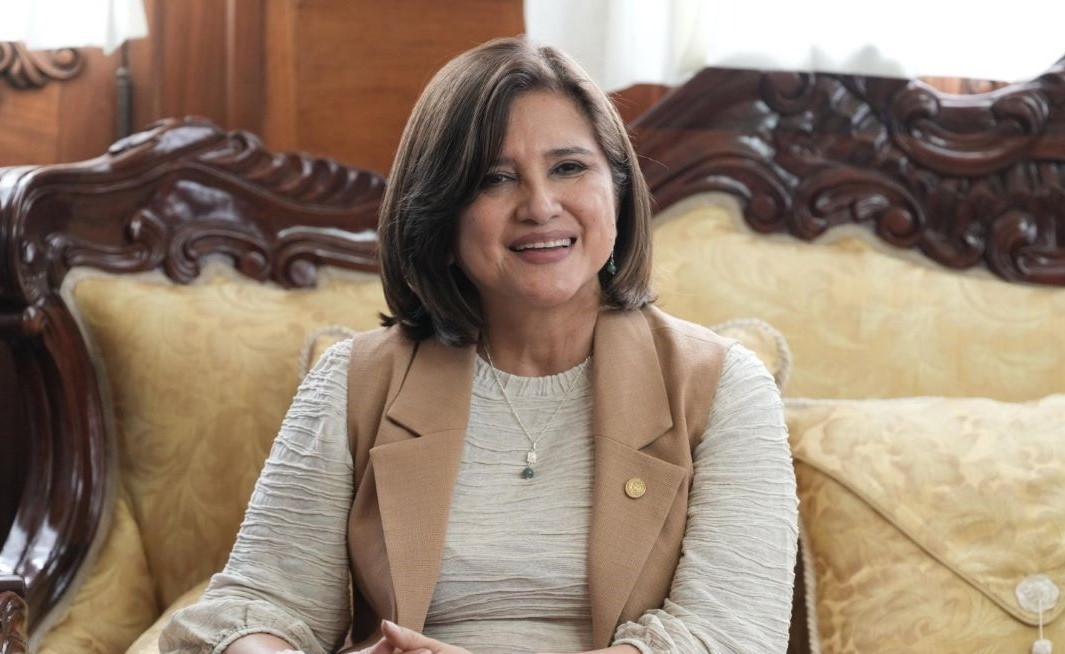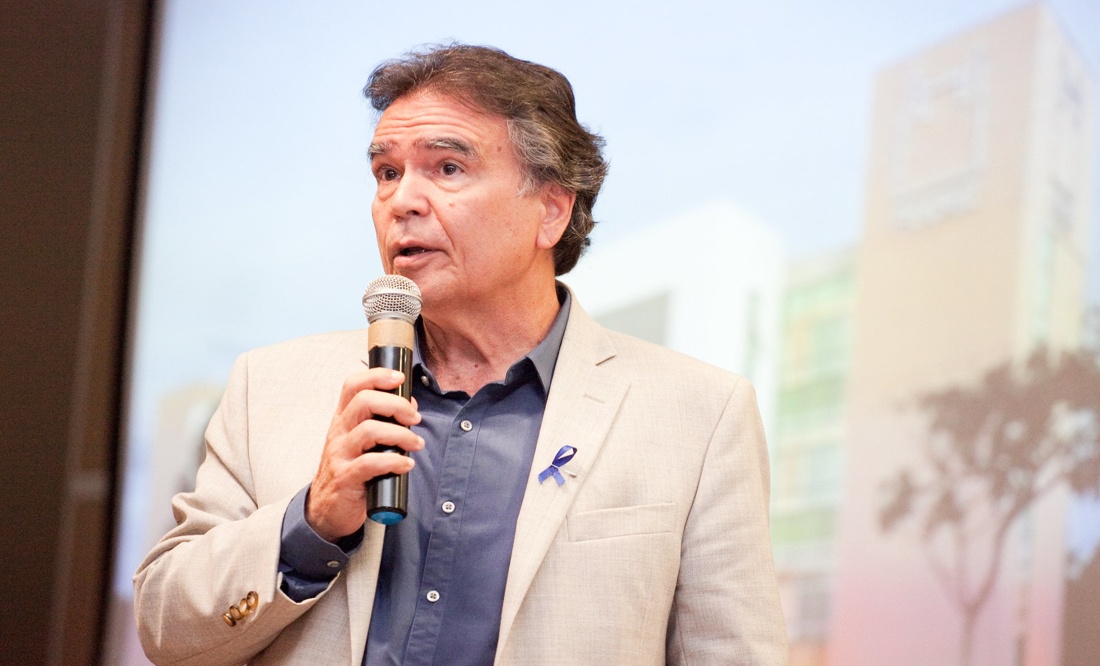 #Interviews
#Interviews
Extreme weather events at the center of the debate
Ahead of the 5th National Conference on STI, former minister of science Sérgio Rezende talks about what he expects from the event, which has been postponed until July due to the floods in Rio Grande do Sul, Brazil
 According to Sérgio Rezende, "the urgent need for a plan to prevent and mitigate the effects of extreme weather events will be one of the key topics" at the 5th National Conference on Science, Technology, and Innovation | Image: Luara Baggi (ASCOM/MCTI)
According to Sérgio Rezende, "the urgent need for a plan to prevent and mitigate the effects of extreme weather events will be one of the key topics" at the 5th National Conference on Science, Technology, and Innovation | Image: Luara Baggi (ASCOM/MCTI)
After 14 years, Brazil will once again hold a National Conference for Science, Technology, and Innovation (STI). The first took place in 1985, with three more held in 2001, 2005, and 2010. The 5th conference will bring together scientists, students, authorities, entrepreneurs, and representatives of society to reflect on the challenges and future of STI in Brazil. The objective is to make diagnoses and recommendations that can support public policy and government actions over the next 10 years.
Physicist Sérgio Machado Rezende of the Federal University of Pernambuco (UFPE) is leading preparation of the event as general secretary. Rezende was Brazil’s minister of science and technology between 2005 and 2010, and in 2022 he was named one of the leaders of a group tasked with formulating STI policies for the first 100 days of President Luiz Inácio Lula da Silva’s administration in 2023.
In an interview with Science Arena, Rezende talked about the preparatory meetings held in recent months to gather suggestions from society for the national conference and to help formulate a new national STI strategy. He also spoke about his expectations for the national conference, which was originally scheduled to take place between June 4 and 6, but was postponed due to the floods in Rio Grande do Sul.
Science Arena – The 5th National Conference on STI was scheduled to take place in Brasília between June 4 and 6, 2024, but was postponed. What happened?
Sérgio Machado Rezende – It was postponed because of the floods in Rio Grande do Sul. At the beginning of last week, we started receiving messages from colleagues from Rio Grande do Sul saying they weren’t sure if they would be able to travel to Brasília for the meeting. The ANAC [National Civil Aviation Agency] suspended all flights into and out of Porto Alegre airport indefinitely, so people were unable to travel.
Many colleagues expressed their solidarity with the people in this terrible situation and suggested postponing the conference. Our first reaction was to stick to our plans because the convention center had already been booked and paid for, but we spoke to Luciana Santos, the minister [of science, technology, and innovation], and she felt like it would be best to postpone the event.
Has a new date been set?
Yes, it will now be held from July 30 to August 1. We are confident that the situation in Rio Grande do Sul will have improved by then.
The floods in Rio Grande do Sul shone a spotlight on the vulnerability of Brazilian cities to extreme events associated with the climate crisis. How will this topic be addressed at the conference?
The urgent need for a plan to prevent and mitigate the effects of extreme weather events will be one of the key topics at the national conference and has already been discussed in preparatory meetings and state and municipal conferences.
The consequences of the storms and flooding in Rio Grande do Sul will be at the center of the debate on science and the climate at the 5th national conference.
We will also have several seminars on the risks of climate change in Brazilian cities and the Amazon, the energy transition, the importance of listening to science to curb the climate crisis, and other topics. The intention is to discuss and propose elements for the formulation of a national strategy with permanent policies in this area.
How did the preparatory events for the national conference go?
They exceeded all expectations. We decided from the beginning that we would hold thematic preparatory meetings because it would not be possible to discuss all of Brazilian science and technology in just three days of the national conference. Initially, we planned to have 15 thematic meetings, but in the end, we had 18. However, people continued to propose other meetings on different topics. We were unable to organize, fund, and oversee every proposed meeting, but we encouraged them to be held and for the outcomes to be forwarded to the national conference. These events came to be called free conferences.
We had 157 free conferences, a much larger number than we ever could have imagined. We also had 27 state, five regional, and ten municipal conferences. The scale of these preparatory events was really surprising. More than 70,000 people participated across the country, a record number in the history of the event.
What challenges were identified during the thematic meetings?
Many of the free conferences were based around science and technology for social development. More than 80 of them dealt with this issue. Another widely discussed topic was public innovation policies designed to encourage companies to invest in research and development in return for public investment.
Brazil’s industrial sector is conservative—it primarily focuses on manufacturing primary products, which are simpler and require little innovation. The country has even created mechanisms to alter this scenario, such as the 2004 Innovation Law, which stimulates innovation and scientific and technological research in various sectors of the economy, and the 2005 “Lei do Bem” bill, which gives tax breaks to companies that invest in research projects.
However, since we don’t have an industrial policy, this legal framework has been less effective than it could be. We are still a long way behind in this regard. It’s a cultural issue that cannot be changed overnight.
A preliminary report released last month by the Brazilian Federal Agency for Support and Evaluation of Graduate Education (CAPES) found that fewer and fewer undergraduate students are interested in pursuing an academic career. How was this topic addressed in the preparatory meetings?
Three of the preparatory events addressed this subject and there will be a session at the national conference, led by CAPES president Denise Carvalho, discussing the paths to postgraduate studies in Brazil and how we can encourage young people to study at a postgraduate level. A common theme I have noticed in all the discussions on this topic is the need to improve career opportunities for people with doctorates.
Public universities are unable to absorb the number of people who graduate with PhDs every year. One option would be to encourage the private sector to employ them.
Brazilian industry still employs a small number of people with doctorates. We hope that with greater interaction between universities and companies, more companies will start to appreciate postgraduate qualifications.
How will the proposals be organized and presented at the national conference?
At every regional and free conference, there was a documentation and systematization committee responsible for organizing any documents, suggestions, and recommendations that arose and sending them to the speakers who will present them at the national conference.
The last national conference was held in 2010. Why has there been such a long wait for the next one?
The first conference took place in 1985, when Brazil’s Ministry of Science and Technology was created, and the following two were held in 2001, the year in which sector funds were created to feed the FNDCT [National Fund for Scientific and Technological Development], and in 2005. Originally, the thinking was that it would be important to hold these meetings every four years.
We managed to continue with this plan for the 4th national conference in 2010, but in the following years, Brazil plunged into a political and economic crisis that resulted in the impeachment of President Dilma [Rousseff] and fluctuations in STI funding.
The situation worsened after the election of President [Jair] Bolsonaro, whose administration was very anti-science, and then there was the pandemic. Things have improved since the election of President Lula, who helped create the conditions needed to hold the 5th conference. One of the recommendations will be that it should take place every four years.
How do these recommendations support public policies and strategies in STI?
As with the previous conferences, we will summarize the recommendations in a book. The aim is to offer guidance to the government to help it develop an action plan for the next 10 years, to recover the country’s scientific capacity, combat deindustrialization, promote social development, and increase investment in research in fields such as health, renewable energy, biotechnology, artificial intelligence, and semiconductors.
*
This article may be republished online under the CC-BY-NC-ND Creative Commons license.
The text must not be edited and the author(s) and source (Science Arena) must be credited.


